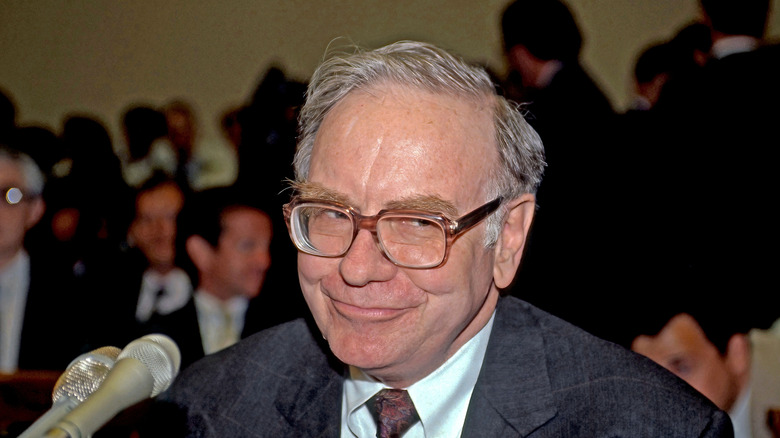Warren Buffett's Best Advice To Manage Tariff Instability
Warren Buffett is well-known for his level headed approach to the investment marketplace. The longtime leader of Berkshire Hathaway delivers plenty of great examples that everyday investors can emulate, and many of his seemingly mystic ways deliver plenty of relevance when things start to turn sour. As predicted by many economists, the administration's tariff plans have set off a massive market correction in the United States and abroad as the global economy reshuffles itself into trade war territory.
The tariff policy has brought major hardship to the bank accounts of investors across the country, but this doesn't means that everything is terrible. Stout investors like Buffett actually see a silver lining in the marketplace when everything goes to pot. In his 2017 shareholder letter, Warren Buffett quoted the famous Rudyard Kipling poem, "If," to help drive his point home: "If you can keep your head when all about you are losing theirs... Yours is the Earth and everything that's in it." These lines — and the remainder of the poem between its ends — act as a great piece of inspiration for how to handle a down market. Buffett is consistent in his stance on instability and negative pressure, and in truth it's a position that every investor should try their best to take. When the market starts to crumble, instead of panicking and selling out of positions, take the opposite tack and double down, or at the very least lock in and hold onto the positions you already have.
'If you can wait and not be tired by waiting'
First and foremost, trading in a down market is all about patience. No one knows when — or if, for that matter — the market will make a recovery. But history suggests that bear markets and correction periods don't often last long in the grand scheme of things. The average correction lasts 115 days – or roughly four months, while bear markets tend to last around 10 months – and the market has trended precipitously upward over the long term, even with abysmal short-term meltdowns thrown into the mix. Waiting for better days is just a part of the life of a trader. Investing is an exercise in prediction and restraint. There is never a guarantee of positive returns, but you can guarantee losses or lost opportunities if you sell when trouble seems to be brewing.
Investors who are set to make the most of their invested capital are the ones who can wait out a period of instability or negative pressure. Selling during a correction locks in realized gains (or losses) at a dampened price point. Instead, waiting will almost certainly see your fortunes turn brighter. At the end of every corrective trading period, the market has returned to a largely positive stance, and it's continued to grow year over year for more than a century. Catastrophic damage to the very economic system that modern civilization lives within may just be the only viable avenue to change this behavior. Waiting is not just the best approach here, it's the duty of a smart investor, even if that means waiting for months or years.
'If you can think – and not make thoughts your aim'
Warren Buffett's most prominent advice to investors is often his assertion that reading and thinking is what underpins all his successes. He notes that time spent reading, even if its something unrelated to the investments he's mulling over, helps him broaden his mindset. The more he can contemplate, the greater the angle of introspection he can take when thinking about an investment. But strategizing for the market's challenges and seeking out positive investment opportunities can feel like a huge ask during times of immense market stress.
Plenty of typically good investments can seem like major losers during times of uncertainty and downward pressure. It can feel like no call is a good one when stocks across the board are melting down. This is where another line of the poem, and part of Buffett's quotation come into play. Thinking about the market and its challenges and opportunities can be divorced from thought about the uncertainty itself. There's no good that can come out of fixating on the bad. Overthinking the conditions of the market and getting stuck in a sense of doom will only minimize your ability to consider opportunities that can help you. View the picture as a larger whole and staying focused on the long term plan you have for yourself is what sets good investors apart from the pack.
'If you can trust yourself when all men doubt you'
This all brings adherents of the Oracle of Omaha's example to a final conclusion. The market is out of your control, but you can think, and conduct research, and wait for things to turn around. The market's long-term performance extends over some truly devastating times in history. The Great Depression, a pair of World Wars and other violent conflicts (with war impacting the market in unique ways with seemingly every new breakout in fighting), and much more have taken place in just the last century of human history. Some of these events have thrown the market off course for a time, while others have come and gone as a mere blip.
Keeping long-term performance and your own personal goals as the central point of focus is the key to lasting success. The market will throw wrenches in your short-term plans, but it largely continues spiriting your investments along over the longer trend line. During times of economic hardship, many people sell off assets and move their money to other investments. But staying the course and trusting in your plan is by far the strongest approach to both a cratering market and one that's jostling violently and unpredictably. Buffett, quoting Kipling, notes that if you can trust your plan and hold your nerve when others are panicking and making rash decisions, "Yours is the Earth and everything that's in it."



